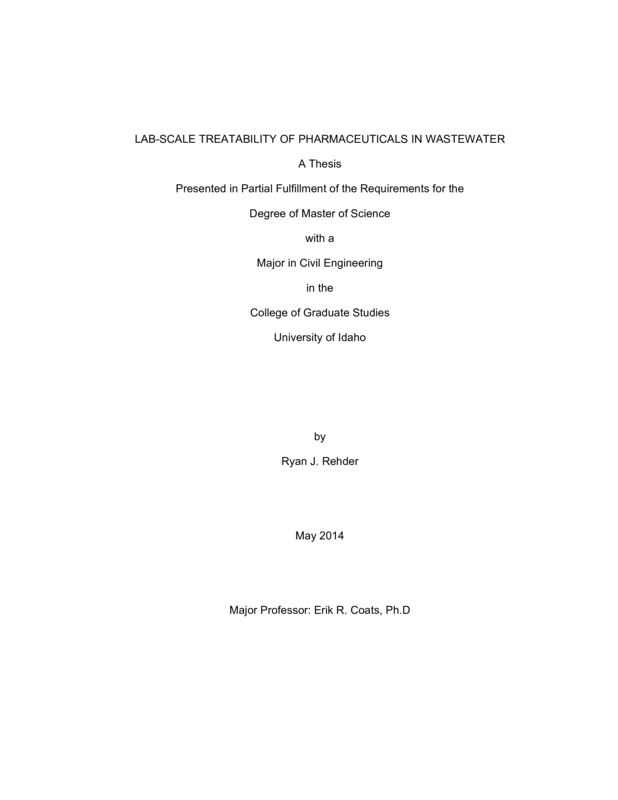Lab-Scale Treatability of Pharmaceuticals in Wastewater
Rehder, Ryan J.. (2014). Lab-Scale Treatability of Pharmaceuticals in Wastewater. Theses and Dissertations Collection, University of Idaho Library Digital Collections. https://www.lib.uidaho.edu/digital/etd/items/rehder_idaho_0089m_10358.html
- Title:
- Lab-Scale Treatability of Pharmaceuticals in Wastewater
- Author:
- Rehder, Ryan J.
- Date:
- 2014
- Keywords:
- Anaerobic Digestion Emerging Contaminants Lab-Scale Pharmaceuticals PPCP Wastewater
- Program:
- Civil Engineering
- Subject Category:
- Engineering; Water resources management
- Abstract:
-
Over the last few decades, considerable attention has been garnered by the introduction of anthropogenic compounds into the natural environment. One sub-class of this group is known as pharmaceutically active compounds (PhACs), which include human and veterinary pharmaceuticals, some active ingredients in human grooming and cleansing products, and disinfectants. Many water quality professionals consider PhACs to be of greater concern than other human generated chemicals because of the nature of the compounds; specifically, PhACs are produced with the intention of creating a biological effect at low concentrations.
A primary source of PhAC introduction into the environment is water resource recovery facilities (WRRFs). Some attention has been given to evaluating existing full-scale WRRFs for their ability to remove PhACs. However, less research attention has been given to PhAC removal at the laboratory-scale, wherein more comprehensive investigations can be conducted.
This study evaluated, at the lab-scale, anaerobic fermentation, conventional activated sludge (aerobic), and anaerobic digestion for treatability of PhACs in wastewater. Additionally, because most of the analytical methods for PhACs are designed around large sample sizes available while evaluating full-scale plants, a modified sample processing and analysis method was developed, based on EPA Method 1694, but tailored for use during lab-scale studies involving small sample sizes.
Research focused on removal of atorvastatin, ciprofloxacin, carbamazepine, triclosan, and acetaminophen. Fermentation and aerobic treatment were observed to remove some, but not all, of the analytes. Conversely, anaerobic digestion exhibited the potential to remove all of the target PhACs. The results of this research should be used as a baseline for further investigations at the lab-scale, both for different treatment processes and for treatment process optimization. Additionally, the sample processing and analytical method developed provide a platform from which further small scale studies can be established.
- Description:
- masters, M.S., Civil Engineering -- University of Idaho - College of Graduate Studies, 2014
- Major Professor:
- Coats, Erik R
- Committee:
- Nielsen, Richard; McDonald, Armando
- Defense Date:
- 2014
- Identifier:
- Rehder_idaho_0089M_10358
- Type:
- Text
- Format Original:
- Format:
- application/pdf
- Rights:
- In Copyright - Educational Use Permitted. For more information, please contact University of Idaho Library Special Collections and Archives Department at libspec@uidaho.edu.
- Standardized Rights:
- http://rightsstatements.org/vocab/InC-EDU/1.0/

